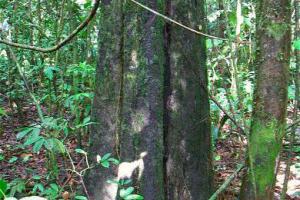Risk Tool
Ebony Diospyros crassiflora
Also know as: African ebony, cubaga, mevini, mopini, ebano, kanran, osibin, ngoubou

D. crassiflora is a medium-sized, slow-growing tree up to 25 meters tall. It is found in lowland semi-deciduous and evergreen forest, up to about 1000 m in elevation, and tends to avoid the wettest forests. It is not a common tree in natural forests, usually found alone or in a small group of 2 or 3 trees. It is harvested by selective logging throughout its natural range, and the wood is considered the true commercial ebony from Africa. The heartwood, the most famous part of the tree’s timber, is jet-black or very dark brown with black streaks. It is very dense and used for heavy flooring, ship building, vehicle bodies, knife handles, guitar fingerboards and, most famously, the black keys of pianos. The bark and sap of the tree have been shown to have antibacterial and antifungal properties, and they are used in traditional local medicine to help treat a variety of ailments.
D. crassiflora timber has been an important export product from its range countries for years, but volumes have been declining, most likely due to increasing scarcity. Big trees of the species are nearly all gone throughout its natural range, including in remote areas. Little is known about how the species regenerates, but because it is so isolated in natural forests and grows so slowly, it is listed as “Endangered” by the IUCN.
Species Details
Export restrictions apply in Cameroon. This species is listed as endangered by the IUCN.